Beyond Lula: The Outlook for the 2010 Brazilian Elections
Alberto Almeida, Director, Instituto Análise; Clifford Young, Executive Director, IPSOS Public Affairs Brazil; Cláudio Gonçalves Couto, Professor, Fundação Getúlio Vargas; Christopher Garman, Director, Eurasia Group; David Fleischer, Professor Emeritus, Universidade de Brasília and President, TCC-Brazil (Transparency, Consciousness and Citizenship); João Augusto de Castro Neves, Founding Partner and Political Analyst, CAC Consultoria
Overview
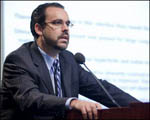 In October, Brazil will hold its sixth consecutive presidential and general elections since the reinstatement of democracy in 1985. This will be the first election that will not feature Luiz Inácio "Lula" da Silva, the country's popular current leader, as a candidate. A seminar, held by the Brazil Institute on April 19 at the Wilson Center, examined the elections' dynamics and offered perspectives on post-election scenarios. Paulo Sotero, director of the Brazil Institute, acted as moderator.
In October, Brazil will hold its sixth consecutive presidential and general elections since the reinstatement of democracy in 1985. This will be the first election that will not feature Luiz Inácio "Lula" da Silva, the country's popular current leader, as a candidate. A seminar, held by the Brazil Institute on April 19 at the Wilson Center, examined the elections' dynamics and offered perspectives on post-election scenarios. Paulo Sotero, director of the Brazil Institute, acted as moderator.
The first panel focused on the polls and potential factors that are likely to influence voters' choices, featuring David Fleischer, professor emeritus at Universidade de Brasília and president of TCC-Brazil (Transparency, Consciousness and Citizenship); Clifford Young, executive director for IPSOS Public Affairs Brazil; and Alberto Almeida, director of Instituto Análise in Brazil.
Fleischer outlined a number of trends in presidential election polls. Brazil is likely to see two rounds of elections between José Serra, the opposition candidate for the Brazilian Social Democracy Party (PSDB), and Dilma Rousseff (PT), President Lula's chosen predecessor. With Lula's approval ratings at 76 percent, an all time high, the critical question is whether Lula will be able to transfer his popularity to the relatively unknown Rousseff. According to Datafolha, 67 percent would vote for President Lula's candidate. Yet, when asked whether voters would support Rousseff, 73 percent said they would not. Out of those 73 percent, 19 percent claimed they were certain to vote for Lula's candidate and 22 percent claimed they might vote for Lula's candidate. "People don't know that Dilma [Rousseff] is Lula's candidate. There is a real need to close the information gap in order to secure the transfer of votes," Fleischer observed.
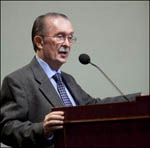 Young cautioned against reading too much into poll numbers this early on, and instead discussed the demands of the Brazilian voters. "Elections are always about big ideas and have a lot to do with how people feel at the time of the election. If you take Brazil right now, it's about optimism," he stated. While in the 1990s voters focused on macroeconomic stability and low inflation, and the 2000s they insisted on social mobility and job creation, today voters want continuity and an increasing reach to a middle class life. Over the past last five years, Brazil experienced an explosion of the middle class, increasing from 34% to 49% of the Brazilian adult population. This increase will impact voter demands; voters are optimistic and do not want drastic change, yet they will be looking for an agenda to increase in the quality of life, mitigate crime, quell drug trafficking, and improve poor quality of education and healthcare.
Young cautioned against reading too much into poll numbers this early on, and instead discussed the demands of the Brazilian voters. "Elections are always about big ideas and have a lot to do with how people feel at the time of the election. If you take Brazil right now, it's about optimism," he stated. While in the 1990s voters focused on macroeconomic stability and low inflation, and the 2000s they insisted on social mobility and job creation, today voters want continuity and an increasing reach to a middle class life. Over the past last five years, Brazil experienced an explosion of the middle class, increasing from 34% to 49% of the Brazilian adult population. This increase will impact voter demands; voters are optimistic and do not want drastic change, yet they will be looking for an agenda to increase in the quality of life, mitigate crime, quell drug trafficking, and improve poor quality of education and healthcare.
According to Young, Rousseff's campaign will focus on promoting social access: increasing telephone and home ownership; personal loans; and access to higher education. In contrast, Serra's ticket will be based around his good managerial abilities: increasing healthcare; providing more continuity and stability than Rousseff; and insisting, under his slogan, "Brazil can do better."
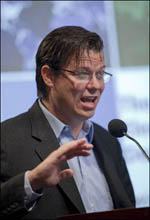 Almeida delved further into analyzing voter demands, contending that in order to win the presidential elections in Brazil the candidates must address the poor without reservations. While in the United States, being poor is equaled to being a loser, he explained, it is considered morally good in Brazil. Therefore, most Brazilians tend to see themselves as poor. To the PT's advantage, the poor is precisely the sector of society that predominantly favors Lula, thanks to the implementation of Bolsa Família (or "Family Grant"). According to a poll conducted by Instituto Análise, the reason why people like Lula is his support of the poor, which demonstrates how his popularity is firmly based on his appeal to the poor. Following in Lula's footsteps and benefiting from his endorsement, Rousseff is already gaining approval among the lower classes.
Almeida delved further into analyzing voter demands, contending that in order to win the presidential elections in Brazil the candidates must address the poor without reservations. While in the United States, being poor is equaled to being a loser, he explained, it is considered morally good in Brazil. Therefore, most Brazilians tend to see themselves as poor. To the PT's advantage, the poor is precisely the sector of society that predominantly favors Lula, thanks to the implementation of Bolsa Família (or "Family Grant"). According to a poll conducted by Instituto Análise, the reason why people like Lula is his support of the poor, which demonstrates how his popularity is firmly based on his appeal to the poor. Following in Lula's footsteps and benefiting from his endorsement, Rousseff is already gaining approval among the lower classes.
Meanwhile, contrary to former President Fernando Henrique Cardoso of PSDB, who knew how to appeal to the lower classes, Serra has yet to do the same. "It is unbelievable that Serra doesn't say the word ‘poor,'" Almeida pointed out, reminding that the word is not politically incorrect in Brazil. To run a successful campaign, Serra would have to minimize the difference to Rousseff among the lower classes by speaking directly to them on topics of their interest. And the priority issue in voters' mind - one that all candidates should address - is increasing consumption, according to a study by Institute Análise.
Post-election scenarios
 The second panel focused on outlooks for each candidates Serra and Rousseff in terms of economic policy and stability, coalitions in congress, and foreign policy agendas. While international investors do not expect significant change in the upcoming elections, Brazilian newspapers and Brazilian elites portray a lot at stake, including the quality of democracy and the nature by which capitalism evolves in Brazil.
The second panel focused on outlooks for each candidates Serra and Rousseff in terms of economic policy and stability, coalitions in congress, and foreign policy agendas. While international investors do not expect significant change in the upcoming elections, Brazilian newspapers and Brazilian elites portray a lot at stake, including the quality of democracy and the nature by which capitalism evolves in Brazil.
Christopher Garman, director at the Eurasia Group argued, "While there is more at stake in this election than meets the eye, I fully agree that the consensus for macroeconomic policies that generate low inflation is very well consolidated amongst the political class."
In forming economic policies, the presidential candidates face what Garman called "the challenge of abundance." For the past 20 years, constrains such as high inflation and debt obligations drove political agendas, causing politicians to remain tied to austere fiscal and monetary policies. With economic abundance, and thus more political freedom, it will be more difficult for Brazil to maintain prudent economic policies.
With these political drivers in mind, Garman elaborated on each candidate's potential economic policies. Rousseff would strengthen state-owned enterprises in sectors such as oil and gas and electricity, threatening competition. However, the PT candidate may surprise investors with a market-oriented fiscal policy driven by an inner circle of economically prudent advisers. With that said, Rousseff would face difficulties to carry out a sound fiscal agenda due to the inheritance of unsustainable government spending policies enacted under the Lula administration. It would be hard for Rousseff, as Lula's candidate to undo these programs. Finally, Garman stressed the worrisome possibility that Rousseff would favor a dovish Central Bank director, which could threaten monetary stability.
Serra would encourage an even tighter fiscal agenda, in part because he can undo Lula's policies without constraints from within his own party. Still, Serra would not be able to pass any fiscal reform that requires a constitutional amendment, due to an increasingly leftist Brazilian Congress. Finally, Serra would halt the reforms for a new oil and gas regulatory framework (which Rousseff supports) and instead implement competitive bid rounds. "I think that we would have a higher growth environment under Serra in comparison to Rousseff," concluded Garman.
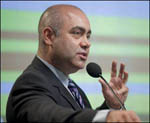 Cláudio Gonçalves Couto, professor at the Fundação Getúlio Vargas, discussed the potential new coalitions under a Rousseff or Serra administration. Couto explained how 20 political parties make up the Brazilian Congress today, and none of these parties have more than 19 percent of the seats in the lower house and 26 percent of the seats in the Senate. One needs 50 percent plus one to pass legislation and 60 percent of the votes in both chambers twice if the legislation requires a constitutional amendment. Wavering discipline among Brazilian political parties make it necessary to have a block greater than 60 percent. Thus, politicians need to build coalitions of 70-75 percent of the seats in congress involving five to seven different political parties in order to gain support for their political agendas.
Cláudio Gonçalves Couto, professor at the Fundação Getúlio Vargas, discussed the potential new coalitions under a Rousseff or Serra administration. Couto explained how 20 political parties make up the Brazilian Congress today, and none of these parties have more than 19 percent of the seats in the lower house and 26 percent of the seats in the Senate. One needs 50 percent plus one to pass legislation and 60 percent of the votes in both chambers twice if the legislation requires a constitutional amendment. Wavering discipline among Brazilian political parties make it necessary to have a block greater than 60 percent. Thus, politicians need to build coalitions of 70-75 percent of the seats in congress involving five to seven different political parties in order to gain support for their political agendas.
Couto divided the 20 political parties in Congress into four categories: the leftist parties that form blocks with the PT (28.5 percent in the House and 24.7 percent in the Senate); the center-right parties that sides with PSDB (24.6 percent in the House and 30.9 percent in the Senate); the parties that support whichever government is currently in office (46.4 percent in the house and 43.2 percent in the Senate); and the parties that do not support the government in office, no matter which party it may be (.6 percent in the House and 1.2 percent in the Senate).
Assuming the next election will generate a fairly similar distribution of political parties among Congressional seats, Couto believed that neither a PSDB administration nor a PT administration would have a hard time passing their policies. This ease is due to a majority of the seats in congress willing to support the government in power no matter what the party. Nonetheless, Couto highlighted that Lula's administration did face some difficulties in the Senate, where the PT formed a block containing only 67 percent of the seats—a difficulty which may continue under a Rousseff administration.
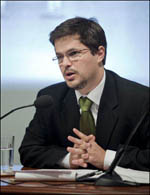 João Augusto de Castro Neves, founding partner and political analyst for CAC Consultoria, discussed potential foreign policy agendas under each of the presidential candidates. Although traditionally foreign policy did not matter much in domestic voter minds, recent indicators reveal that domestic voters have begun to pay more attention to foreign policy when making electoral choices. Castro Neves pointed to three reasons for this change: first, Brazil has become involved with recent international controversial issues, such as Iran, cotton subsidy retaliations, and global agendas such as South-South relations; second, Brazil has undergone structural changes in democracy and economic liberalization, which moved foreign relations away from being solely under the guidance of Brazil's Foreign Ministry, Itamaraty, and into the public eye and the Congress; and finally, executive agencies have become more involved in the foreign policy decision-making process.
João Augusto de Castro Neves, founding partner and political analyst for CAC Consultoria, discussed potential foreign policy agendas under each of the presidential candidates. Although traditionally foreign policy did not matter much in domestic voter minds, recent indicators reveal that domestic voters have begun to pay more attention to foreign policy when making electoral choices. Castro Neves pointed to three reasons for this change: first, Brazil has become involved with recent international controversial issues, such as Iran, cotton subsidy retaliations, and global agendas such as South-South relations; second, Brazil has undergone structural changes in democracy and economic liberalization, which moved foreign relations away from being solely under the guidance of Brazil's Foreign Ministry, Itamaraty, and into the public eye and the Congress; and finally, executive agencies have become more involved in the foreign policy decision-making process.
In looking towards the candidates' potential foreign policy agenda, one certainty Castro Neves pointed to is that neither candidate will embody the charisma and global popularity of President Lula. This gives either candidate a weaker position on global agendas. Rousseff will most likely attempt to follow in President Lula's foreign policy path. However, without the same charisma and popularly, she will need a broader political coalition, meaning a larger cabinet and a wider variety of voices directing Brazil's foreign policy. Like Lula, Rousseff may even face internal pressures from her own party; however, unlike Lula, Rousseff would find it harder to fend off these forces. "These are all ingredients for a riskier, and possibly frustrated, foreign policy," stated Neves.
Serra will be supported by a smaller coalition in Congress and will govern with a smaller cabinet, which will lead to less divergent voices on foreign policy issues. Serra, whose party already criticized recent foreign policy decisions of President Lula, will need to set a clear message from the beginning on issues such as trade and relations with countries like Iran, Cuba, and Venezuela. Serra would create a more mainstreamed foreign policy, mirroring that of Former President Fernando Henrique Cardoso. Nevertheless, because Brazil has gained substantial global significance, it will be hard to carry out a less bold foreign policy agenda without seeming less ambitious.
By Amanda Early
Paulo Sotero
Documents & Downloads
- Beyond Lula: The Outlook for the 2010 Brazilian ElectionsDownload
- Beyond Lula: The Outlook for the 2010 Brazilian ElectionsDownload
- Beyond Lula: The Outlook for the 2010 Brazilian ElectionsDownload
- Beyond Lula: The Outlook for the 2010 Brazilian ElectionsDownload
- Beyond Lula: The Outlook for the 2010 Brazilian ElectionsDownload
- Beyond Lula: The Outlook for the 2010 Brazilian ElectionsDownload
- Beyond Lula: The Outlook for the 2010 Brazilian ElectionsDownload
- Beyond Lula: The Outlook for the 2010 Brazilian ElectionsDownload
- Beyond Lula: The Outlook for the 2010 Brazilian ElectionsDownload
- Beyond Lula: The Outlook for the 2010 Brazilian ElectionsDownload
Hosted By

Brazil Institute
The Brazil Institute—the only country-specific policy institution focused on Brazil in Washington—works to foster understanding of Brazil’s complex reality and to support more consequential relations between Brazilian and US institutions in all sectors. The Brazil Institute plays this role by producing independent research and programs that bridge the gap between scholarship and policy, and by serving as a crossroads for leading policymakers, scholars and private sector representatives who are committed to addressing Brazil’s challenges and opportunities. Read more
Thank you for your interest in this event. Please send any feedback or questions to our Events staff.










